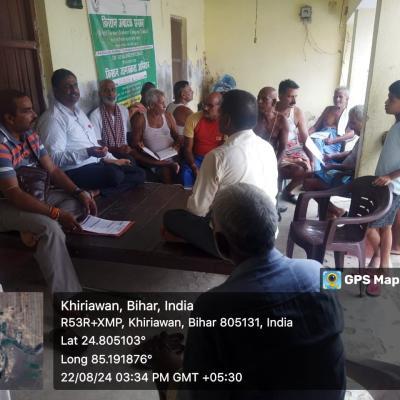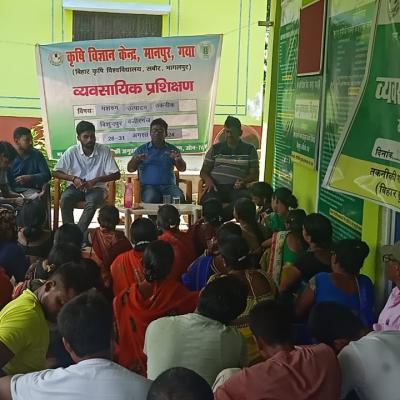About Training
🚜 Why is Training Required for Farmers?
Empowering Farmers | Enhancing Productivity | Ensuring Sustainability
Agriculture is the backbone of the economy, and farmers play a crucial role in feeding the world. However, with changing climate conditions, soil degradation, market fluctuations, and increasing demand for organic food, training has become essential for farmers to stay updated, improve productivity, and ensure sustainable farming practices.
📌 Key Reasons Why Training is Essential for Farmers
1️⃣ Adoption of Modern Farming Techniques
✅ Learn about advanced agricultural practices such as organic farming, precision agriculture, and sustainable pest control
✅ Implement smart irrigation techniques like drip irrigation to save water
✅ Understand the benefits of crop diversification & intercropping
2️⃣ Improved Productivity & Higher Yield
✅ Learn ways to increase crop yield without harming the environment
✅ Adopt natural fertilizers & bio-pesticides for healthier soil and crops
✅ Reduce post-harvest losses through better storage & transportation methods
3️⃣ Cost-Effective & Profitable Farming
✅ Reduce expenses by using organic compost instead of chemical fertilizers
✅ Learn cost-saving irrigation methods to reduce water consumption
✅ Gain knowledge on efficient resource management & low-cost farming inputs
4️⃣ Soil & Water Conservation
✅ Prevent soil degradation by using crop rotation & natural soil enhancers
✅ Learn rainwater harvesting & water conservation techniques
✅ Reduce dependency on synthetic inputs that harm the environment
5️⃣ Market Access & Increased Income
✅ Get insights into direct selling, branding, and digital marketing of farm produce
✅ Learn how to access government schemes, FPO benefits, and financial support
✅ Improve profit margins by connecting with exporters, retailers & organic markets
6️⃣ Awareness About Government Policies & Subsidies
✅ Understand various government programs, NABARD schemes, and subsidies
✅ Learn the process of getting loans for farming expansion
✅ Take advantage of crop insurance & risk management programs
7️⃣ Climate Change Adaptation & Risk Management
✅ Learn ways to protect crops from droughts, floods, and erratic weather patterns
✅ Use climate-smart techniques to reduce farming risks & improve sustainability
✅ Reduce reliance on chemical pesticides that contribute to soil and water pollution
8️⃣ Sustainable Farming for Future Generations
✅ Implement eco-friendly farming practices that reduce environmental damage
✅ Preserve biodiversity by adopting integrated farming systems
✅ Promote self-reliant, profitable, and climate-resilient farming
Training Methods
NASP Farmer Producer Company Limited (NASP FPCL) adopts a holistic and practical approach to training farmers, ensuring they gain hands-on experience and knowledge to enhance agricultural productivity and sustainability. Below are the key training methods:
1. On-Field Demonstration
Practical sessions conducted on farms to showcase best agricultural practices.
Live demonstrations of organic farming, dairy management, and sustainable agriculture.
2. Workshops & Seminars
Expert-led workshops on advanced farming techniques, financial literacy, and cattle management.
Interactive sessions with agronomists, veterinarians, and industry specialists.
3. Digital Learning & Webinars
Online training modules and virtual workshops for remote accessibility.
Use of mobile apps and video tutorials for continuous learning.
4. Farmer Exchange Programs
Visits to model farms to learn from experienced farmers.
Exposure to successful agricultural techniques and innovations.
5. Hands-on Training Sessions
Step-by-step guidance on seed selection, irrigation methods, organic composting, and animal husbandry.
Training in modern equipment handling and farm mechanization.
6. Group Discussions & Peer Learning
Interactive discussions among farmers to share experiences and best practices.
Problem-solving sessions to address challenges in farming and dairy management.
7. Market Linkage Training
Awareness programs on how to connect with markets and increase profitability.
Guidance on supply chain management and direct farmer-to-consumer sales.
8. Government & NABARD-Supported Programs
Training in availing subsidies, loans, and financial assistance.
Collaboration with government schemes to maximize benefits for farmers.
 English
English  Hindi
Hindi 





